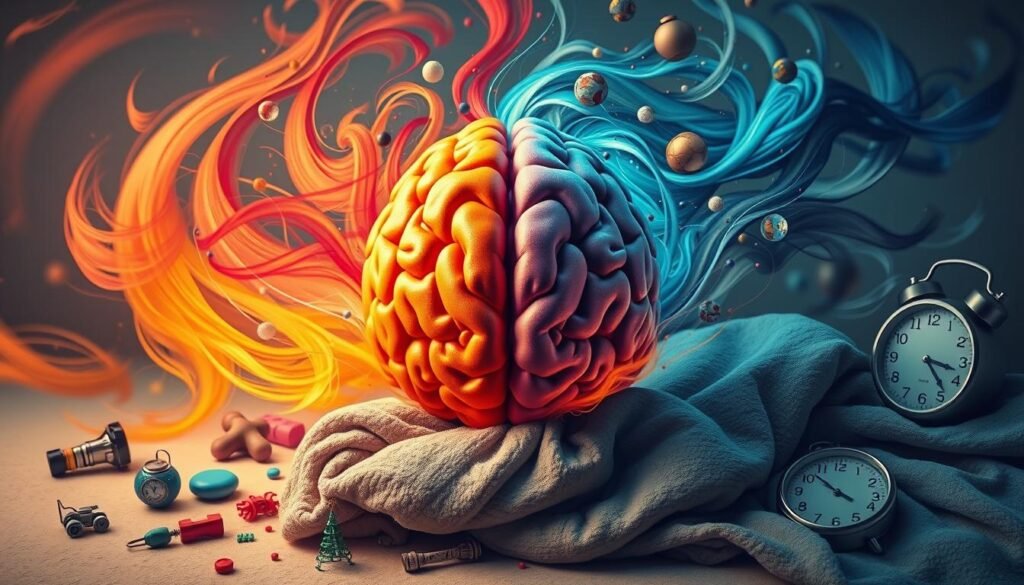In 2019, a study showed a clear link between nurses with ADHD and chronic fatigue. This research points to a major issue for many dealing with ADHD. Though not officially listed as a symptom, fatigue is often reported by those with ADHD. It makes daily life harder. ADHD symptoms like hyperactivity and trouble sleeping can drain your energy.
For those with ADHD, feeling tired is common. It’s important to understand how ADHD can cause these feelings of exhaustion. ADHD-related fatigue is tied to both mental and emotional challenges. For example, slow mental processing affects many. Distractions and a lack of drive add to the constant feeling of being tired.
This article will explore the link between ADHD and fatigue. We’ll look at what causes tiredness and share tips for dealing with it. If you want help handling ADHD’s complex challenges, you’re in the right place. To learn more, check out natural remedies for fatigue.
Key Takeaways
- ADHD can lead to significant fatigue, even if it is not classified as an official symptom.
- A 2017 study confirmed that individuals with ADHD, including healthcare professionals, often experience tiredness.
- Sluggish cognitive tempo, a condition prevalent in ADHD, contributes to feelings of lethargy.
- Cognitive overload and emotional stressors in ADHD can exacerbate fatigue levels.
- Effective management strategies can help address and alleviate ADHD fatigue symptoms.
The Link Between ADHD and Fatigue
Understanding the link between ADHD and fatigue is key. People with ADHD often feel very tired and mentally worn out. This is because their ADHD symptoms, like being very active, acting on impulse, and not paying attention, wear them down.
Understanding ADHD Symptoms
ADHD symptoms show up in different ways for different people. Being very active might seem like it gives you energy at first. But it can actually make you very tired because you’re always moving. Having trouble focusing and acting without thinking can make stress worse. This makes it tough to stay on task. These issues lead to the tiredness people with ADHD feel, affecting their day-to-day life.
Common Experiences of Fatigue in Individuals with ADHD
Many people with ADHD feel very tired. Research shows that 62% of people with ADHD say they often feel fatigued. Anxiety, which is common in ADHD, can make this tiredness worse. Also, sleep problems like not being able to sleep well can make the tiredness even more intense.
People who have demanding jobs might push themselves too hard, which lowers their energy. Having a regular sleep schedule is important to fight this tiredness. By understanding ADHD better, people can deal with their tiredness in a more effective way.
| Factor | Impact on Fatigue |
|---|---|
| Hyperactivity | Leads to physical exhaustion |
| Sleep Issues | Worsens fatigue levels |
| Anxiety | Increases feelings of tiredness |
| Overworking | Severely affects health and energy |
| Caffeine Intake | Can exacerbate anxiety and fatigue |
Can ADHD Cause Fatigue?
ADHD and fatigue are closely linked, affecting many people’s daily lives. Although not officially a symptom, many with ADHD feel very tired. This situation leads us to ask if ADHD is the cause of their fatigue.
People with ADHD often find daily tasks harder than others. They need more energy to stay organized and concentrate, which makes them tired. Struggling with sleep adds to their fatigue, as inconsistent sleep patterns cause tiredness and burnout.
An imbalance of dopamine, important in ADHD, also plays a role. This issue makes the brain work harder, requiring more effort for tasks. This extra effort can cause tiredness and emotional drain.
Treatments like neurofeedback and neurostimulation show hope in managing symptoms. The Drake Institute has been aiding patients for over 40 years. It helps reduce ADHD-related fatigue and improves life quality.
Making changes in lifestyle is also key. Better sleep, a healthy diet, and regular exercise can lessen fatigue. Especially, exercise releases endorphins, boosting happiness and energy levels.
ADHD Fatigue Symptoms
It’s important to understand ADHD fatigue symptoms if you have ADHD. This fatigue feels a bit like being very tired, but it’s not the same. It happens because of ADHD symptoms, sleeping problems, and the energy it takes to get through the day.
Defining ADHD Fatigue
ADHD fatigue is more than just feeling tired. People with ADHD often face different kinds of fatigue. This can happen for many reasons, like not having enough dopamine. This makes thinking hard and tasks take more effort, which makes you feel wiped out. Not treating ADHD can also cause burnout. This includes feeling unmotivated and easily annoyed.
Different Manifestations of Fatigue
ADHD causes different kinds of fatigue. Some common ones are:
- Mental Fatigue: This means having trouble focusing and feeling like your brain is foggy, which makes tasks harder.
- Physical Exhaustion: This leaves people feeling really tired, affecting their everyday life.
- Burnout: This is feeling tired all the time with irritability and being overwhelmed, due to the constant effort of managing ADHD symptoms.
Sleep problems often make these symptoms worse. Between 25% and 50% of those with ADHD have trouble sleeping, like insomnia or sleep apnea. These sleep issues can worsen fatigue, creating a bad cycle. Knowing about ADHD fatigue helps people recognize and deal with their symptoms better.
| Type of Fatigue | Description |
|---|---|
| Mental Fatigue | Difficulty concentrating and brain fog that complicates simple tasks. |
| Physical Exhaustion | Generalized tiredness affecting energy levels and daily functioning. |
| Burnout | A state of chronic fatigue, irritability, and lack of motivation. |
ADHD and Tiredness: Exploring the Connection
ADHD and tiredness are closely linked, and dealing with both can be hard. Individuals with ADHD face unique challenges daily. These challenges often lead to a special kind of tiredness called hyperactivity fatigue.
It happens because managing hyperactivity takes a lot of energy. This makes mental exhaustion a big problem for those with ADHD. It impacts everyday life in big ways.
The Role of Hyperactivity in Fatigue
People with ADHD are usually more active. This non-stop activity can be tiring, even if it seems energizing at first. By the day’s end, they often feel totally drained.
Managing ADHD means working harder to stay focused and organized. This extra effort makes them even more tired.
Effects of Mental Exhaustion from ADHD Symptoms
Mental exhaustion from ADHD shows up in different ways. For example, it’s hard to focus, and easy to act on impulse or get disorganized. Fighting these issues all the time is exhausting.
Everyday tasks can then seem very hard. Sleep problems, medication side effects, and anxiety make the tiredness worse.

| Contributing Factors | Effects on Tiredness |
|---|---|
| Hyperactivity | Increased energy expenditure leading to mental and physical fatigue |
| Sleep Disorders | Interruptions in sleep cycle contribute to feelings of chronic tiredness |
| Mental Effort | Extra cognitive resources used to maintain focus results in exhaustion |
| Environmental Sensitivity | Difficulty in adapting to sensory stimuli can lead to overwhelming fatigue |
| Medication Side Effects | Some treatments can cause drowsiness or fatigue during daily activities |
Getting to know these factors helps in managing ADHD and tiredness. It’s important for making life better.
Adult ADHD Fatigue
Adults with ADHD face unique challenges every day. These obstacles often lead to adult ADHD fatigue. This makes handling daily tasks very hard.
The mix of personal and work demands causes a lot of stress. This stress adds to the fatigue, making it feel never-ending.
Unique Challenges Faced by Adults with ADHD
For adults with ADHD, doing daily activities is harder. They struggle with time management and keeping focus. Combining family, work, and social life leaves them tired.
Having a hard time making decisions and controlling emotions uses lots of energy. This drains their energy even more, making them feel constantly tired.
The Impact of Life Responsibilities on Energy Levels
Life’s duties really lower energy for those with ADHD. They often feel more burnt out and take more sick days than others. This extreme fatigue makes it tough to meet their commitments.
A study linked lifestyle to fatigue, noting the importance of tackling these issues. It casts light on the challenges of managing energy and making decisions. For more insights on battling fatigue, check out conditions that might contribute.
Managing ADHD Fatigue
People with ADHD often face tough challenges with fatigue. They can find their day-to-day energy better managed with the right techniques. Making a daily plan that includes rest times is key to beat tiredness.
Also, finding ways to be productive without stress is essential in dealing with ADHD fatigue.
Strategies for Daily Energy Management
There are helpful strategies to improve energy every day:
- Set realistic goals: Split tasks into smaller steps to avoid being overwhelmed.
- Prioritize tasks: Choose the most important activities and do them first.
- Utilize organizational tools: Use planners, apps, or reminders to keep organized and lessen mental strain.
- Practice time management: Set timers to work intensely for set times, then take short breaks.
The Importance of Scheduling Breaks
Planning breaks in your day helps keep focus and lower tiredness. Taking breaks regularly helps your mind refresh and keeps attention sharp. For managing ADHD fatigue, it’s about:
- Short breaks: Every hour, take 5–10 minutes to stretch, drink water, or do a quick relaxation exercise.
- Longer breaks: Use longer breaks, like lunchtime, to step away from work tasks completely.
- Movement breaks: Add some physical activity in your breaks to lift your energy and relax your muscles.

ADHD Brain Fog and Exhaustion
Brain fog in ADHD is common but often not fully understood. It shows up as confusion, forgetfulness, and trouble focusing. These issues make everyday tasks very hard. It’s more than an inconvenience; it leads to a tough cycle of exhaustion and brain fog.
Understanding Brain Fog in ADHD
Brain fog and fatigue in ADHD can make someone feel very tired and unproductive. Studies show that 25 to 55 percent of kids with ADHD have trouble sleeping. This lack of sleep makes them more tired. In adults, about 43 percent face these sleep issues too, which makes it harder to think clearly and causes constant tiredness.
In people with ADHD, high cytokine levels can affect memory and reaction times, making them feel more tired. ADHD medicines might also cause tiredness and sleepiness during the day. Knowing how to handle ADHD symptoms and understanding the reasons for these feelings is key.
To better manage ADHD, improving sleep and exercising regularly is vital. Exercise, in particular, can greatly improve focus for people with ADHD. Setting a daily routine, doing calming activities, or recognizing small achievements can help with mental tiredness. Looking into these methods can offer new hope for overcoming ADHD brain fog.
| Contributing Factors | Effects on Daily Life |
|---|---|
| Sleep Disturbances | Increased fatigue |
| Cytokine Levels | Reduced attention and memory problems |
| Medication Side Effects | Exhaustion and daytime drowsiness |
| Lack of Exercise | Cognitive decline and increased brain fog |
Improving these aspects can lead to better mental clarity and energy. For more on how sleep can help with ADHD, read about effective sleep strategies.
ADHD Sleep Issues and Their Impact on Fatigue
Many people with ADHD find it tough to get a good night’s sleep. About 67% of them struggle with sleep issues. This leads to feeling very tired during the day. It affects their daily life. Some might have specific sleep disorders, making things harder.
Common Sleep Disorders in Individuals with ADHD
People with ADHD often have sleep problems like insomnia or sleep apnea. About 25% have issues with breathing while sleeping. And around 44% could have Restless Legs Syndrome (RLS). Trouble sleeping happens for various reasons. It could be ADHD symptoms or the side effects of ADHD medication.
Strategies to Improve Sleep Quality
Improving sleep with ADHD means making good sleep habits. Here are some tips:
- Avoiding naps during the day
- Steering clear of caffeine intake close to bedtime
- Creating a calming bedtime routine to signal the body it’s time to wind down
- Maintaining a consistent sleep schedule by going to bed at the same time each night
- Ensuring the sleep environment is comfortable, dark, and quiet
Trying these methods can help tackle adhd sleep issues. It may reduce fatigue from ADHD.

| Sleep Disorder | Prevalence in ADHD | Common Symptoms |
|---|---|---|
| Insomnia | 25% – 50% | Difficulties falling/staying asleep |
| Sleep Apnea | About 3% | Paused breathing during sleep, snoring |
| Restless Legs Syndrome (RLS) | Up to 44% | Uncomfortable sensations in legs, urge to move |
It’s important to address sleep disorders in adhd. With the right steps, one can achieve better sleep. This leads to more active and happier days.
ADHD Treatment for Fatigue
Treating ADHD is complex, especially with fatigue. Both medication and therapy play roles in managing fatigue from ADHD.
Medication Side Effects and Fatigue
Stimulant medications can cause fatigue in ADHD patients. Adderall and Ritalin might lead to tiredness after they wear off. Over 60% of adults with ADHD feel significant fatigue. It’s important to balance medication benefits against their side effects.
Knowing the side effects helps patients discuss alternatives with their doctors.
Therapeutic Approaches to Alleviate Symptoms
Therapy, like CBT, helps manage ADHD and fatigue. Adding simple exercises, like short walks, boosts energy. Managing sleep issues is also key.
Kids with ADHD often struggle with sleep, spurring more fatigue. Addressing sleep can improve their overall health.
Considering both therapy and lifestyle changes offers balanced solutions. For more details, check available ADHD treatments.
Conclusion
It’s key to see the link between ADHD and fatigue, affecting 4.4% of adults and about 5.3 million kids in the U.S. Research on ADHD and fatigue shows that fatigue syndrome often comes from ADHD challenges. These can make symptoms like inattention and irritability worse. This struggle can cause a lot of tiredness, so it’s important to find ways to manage ADHD fatigue.
Good sleep, exercise, and mindfulness can greatly boost energy and life quality. Therapy, structured routines, and possibly medication can help with the exhaustion ADHD often brings. By noticing fatigue early and knowing your limits, you can avoid ADHD burnout. This helps create a more balanced life.
Knowing how ADHD and fatigue are linked helps people take charge of their health. Getting the right help and trying different ways to manage it are crucial steps. Making these changes can bring more energetic and rewarding days. This improves life quality for those dealing with ADHD fatigue.